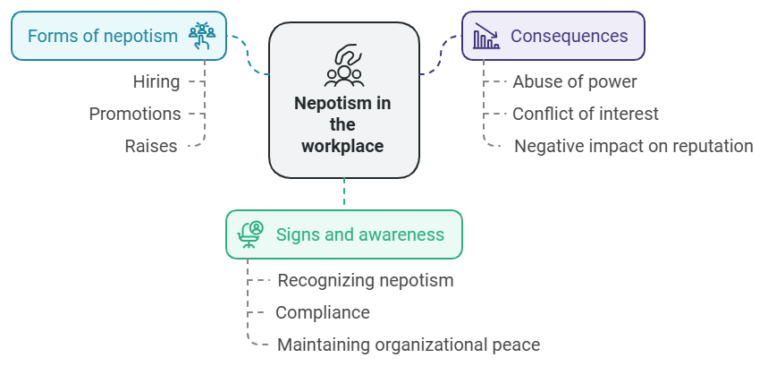Networking or Nepotism: Understanding the Fine Line in Career Advancement

In our fast-moving world where opportunities are limited and everything is competitive, one of the easiest ways to scale has been knowing the right persons — but at what point does that advantage cross the line from networking to nepotism?
The topic of networking Versus nepotism has been one enduring debate in the career space, and understanding the distinction between the two is crucial to navigating one's career.
UNDERSTANDING THE KEY TERMS
Before proceeding to highlight the similarities and differences between nepotism and networking, it is pertinent to have a clear understanding of what both concept means — as many have long misused one for the other.
Networking and nepotism are almost indistinguishable when connections are passed down like family heirlooms, and in industries where competition is fierce, access is often the real currency, making it crucial to distinguish between legitimate networking and favoritism-based advantage.
What Networking Is
Building connections with the right set of persons at the right time has been crucial to helping individuals land quality jobs. This is what networking is, and not just any kind of networking — Professional Networking.
Networking is a mutually beneficial interaction that involves exchanging ideas and information between individuals who are connected by a common interest.
Professional networking on the other hand refers to the act of building and maintaining relationships with other professionals in similar fields.
Professional networking can take many forms like; joining professional organisations like Junior Chamber International (JCI), Rotaract, AiESEC among others, participating in online communities like LinkedIn Local, attending industry gatherings like the TEDx events and seeking out mentorship or coaching. Platforms like Twitter, Instagram and LinkedIn have been known to be useful in securing meaningful connections.

Professional Networking has proven to be essential in promoting the career of individuals and helping individuals land their first job. A recent article publishes that thirty-one percent of job seekers find listings through professional connections, especially referrals.
To work, networking usually means building relationships before you seek a job and when done honestly, networking can demonstrate that you’re proactive, easy to work with, and likeable. This alone has landed people jobs.
Networking is also a reason why many job updates never makes it to the public. A publication from management consultant provides that a significant portion of available roles—some estimates suggest up to 70%—never make it to job boards or public listings.
This is because most of those roles are filled through internal hires, they’re sourced through personal networks, or industry events, or other means.
What Nepotism is
Nepotism in hiring or the workplace is no new phenomenon. It has shaped industries for centuries.
Nepotism in the workplace by contrast, is simply when hiring or promotion decisions are made based on personal relationships instead of qualifications. It often shows up when family members or close friends receive opportunities ahead of more qualified candidates.

If a candidate is referred for a particular role and they get it due to the personal relationship they have with a senior staff, despite being unqualified serves as a perfect example of Nepotism.
Nepotism also manifests in everyday favoritism, from pushing certain employees to get better projects, giving lenient performance evaluation or simply getting flexible schedules that other colleagues are denied.
This kind of special treatment chips away at workplace morale because it creates two sets of rules: one for those with connections and another for everyone else.
When Nepotism takes hold of any workplace, it can have drastic consequences on the company's output. By consistently favouring others, hardworking employees can simply resort to doing only what is expected of them and nothing more.
Nepotism can cause an unhealthy work environment. This stems from dissatisfactions that come from the fact that their inputs are never taken into consideration as the only thing they have to offer is their services and they have no man in the upper room to vouch for them.
Where Networking Ends and Nepotism Begins
Networking and Nepotism are simply two ends of a single rope — one end promotes and pushes skilled people to secure stable jobs while the other end promotes and pushes people to secure jobs irrespective of their qualifications. Understanding where one ends and the other begins is essential for navigating the professional landscape.
Networking complements skills and qualifications, whereas Nepotism overrides merit.
Like the fictional story shared in the article "The Weakest Link: How Humans Endanger Cyber Security" , the managing director attempted to place his inexperienced nephew in the delicate role of Data Protection Officer. This is a classic example of what Nepotism in the workplace looks like.
If Mr. Adepoju the sitting Data Protection officer had not resisted the Managing director's request, their company would have witnessed series of cyber attacks that would have probably brought down the company.
In contrast, getting a referral from a network simply gets you a foot at the door, and your skills is what helps secure the job not the referral.
Intent and Transparency.
Networking is known to be transparent and everyone involved understands that the connection is being leveraged ethically. Nepotism on the other hand is often hidden favouritism, favouring a person because of their personal relationship, not their ability.
Impact on Others.
Networking benefits both parties without negatively affecting others.
Take for example, A fresh Architect still needing experience meets a businessman. While conversing, the Architect explains what he does and how much experience he has garnered, as well as projects he has featured in.
The business man wanting to help this young man, introduces him to a professional Architect with decades of experience who inturn features him in one of his projects as an assistant — this is networking where opportunity builds skill and experience without displacing someone more competent.
In contrast, if the learning architect was a relative or close friend of the business man, and then the business man in a bid to help a close friend reaches out to his seasoned architect friend and asks if he has projects he wants to sub contract.
If this young architect gets this contract, and doesn't meet expectations, it can first, have a negative impact on the relationship between them and also damage the reputation of the Architect for subcontracting to someone not experienced enough.
Documentation and Policies
Networking doesn't conflict formal rules; Nepotism on the other hand violates HR guidelines or anti-discrimination policies.
The Perceived V. The Actual
At various instances, networking looks like Nepotism to outsiders and maybe to an extent, there are traces of nepotism there.
A highly qualified candidate referred by a senior officer may be perceived as having an unfair advantage, even if merit ultimately secured the role.
This instance here questions the point where Networking becomes Nepotism. While the candidate may have indeed been qualified, the perception that their selection was influenced more by personal connection than merit can undermine trust among colleagues and cause doubt to the fairness of the hiring process.
What was initially intended to favour the most qualified now risks been seen as a cover for favoritism, illustrating how intent, transparency, and context determine whether a professional connection remains networking or crosses into Nepotism.
Ultimately, the most important thing is that networking must support merit, not substitute for it and organisations should ensure that referrals and recommendations are always coupled with fair evaluation of skills and performance.
Recommended Articles
There are no posts under this category.You may also like...
Super Eagles Fury! Coach Eric Chelle Slammed Over Shocking $130K Salary Demand!
)
Super Eagles head coach Eric Chelle's demands for a $130,000 monthly salary and extensive benefits have ignited a major ...
Premier League Immortal! James Milner Shatters Appearance Record, Klopp Hails Legend!

Football icon James Milner has surpassed Gareth Barry's Premier League appearance record, making his 654th outing at age...
Starfleet Shockwave: Fans Missed Key Detail in 'Deep Space Nine' Icon's 'Starfleet Academy' Return!

Starfleet Academy's latest episode features the long-awaited return of Jake Sisko, honoring his legendary father, Captai...
Rhaenyra's Destiny: 'House of the Dragon' Hints at Shocking Game of Thrones Finale Twist!

The 'House of the Dragon' Season 3 teaser hints at a dark path for Rhaenyra, suggesting she may descend into madness. He...
Amidah Lateef Unveils Shocking Truth About Nigerian University Hostel Crisis!

Many university students are forced to live off-campus due to limited hostel spaces, facing daily commutes, financial bu...
African Development Soars: Eswatini Hails Ethiopia's Ambitious Mega Projects

The Kingdom of Eswatini has lauded Ethiopia's significant strides in large-scale development projects, particularly high...
West African Tensions Mount: Ghana Drags Togo to Arbitration Over Maritime Borders

Ghana has initiated international arbitration under UNCLOS to settle its long-standing maritime boundary dispute with To...
Indian AI Arena Ignites: Sarvam Unleashes Indus AI Chat App in Fierce Market Battle

Sarvam, an Indian AI startup, has launched its Indus chat app, powered by its 105-billion-parameter large language model...
